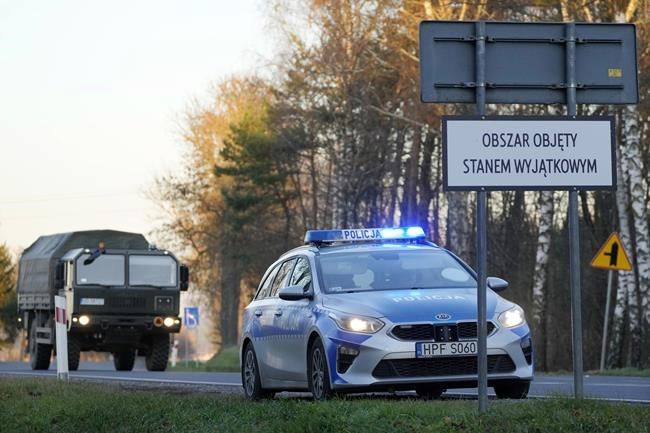WARSAW, Poland (AP) — Chancellor Angela Merkel asked Russian President Vladimir Putin on Wednesday to intervene with Belarus over the migrant situation on that country’s border with Poland, where groups of migrants made bold attempts this week to cross into European Union territory.
The chancellor’s office said Merkel spoke with Putin by phone and underlined that the exploitation “of migrants against the European Union by the Belarusian regime is inhuman and completely unacceptable.” Merkel asked the Russian president "to exert his influence on the regime in Minsk,” her office said.
Russia is a close ally of the government in Belarus. Germany is a favored destination for migrants who manage to enter the EU.
The readout of the call released by the Kremlin said Putin “proposed to establish a discussion of the problems that have arisen in direct contacts of representatives of the EU member states with Minsk.” It also said that Putin and Merkel “agreed to continue the conversation on the issue.”
Meanwhile, European Council President Charles Michel was in Warsaw on Wednesday to show support for Poland as it faces migration pressure and a humanitarian crisis on a border that also forms the eastern edge of the EU.
Poland’s Defense Ministry and local police reported Wednesday that multiple groups of migrants tried to enter the country late Tuesday and early Wednesday but that all the people who made it were detained.
Hundreds of migrants have been camping since Monday on the Belarus side of the border, across from the Polish village of Kuznica.
Poland’s Defense Ministry also accused Belarusian forces of firing shots into the air in a border area where migrants caught between the neighboring countries have set up a makeshift camp. The ministry posted a video on Twitter with noises of what sounded like shots.
In recent months, Poland, Lithuania and to a lesser degree, Latvia, all EU members located on the 27-nation bloc's eastern border, have complained about unusually high numbers of migrants entering or trying to enter the countries from Belarus.
EU leaders accuse the regime of Belarusian President Alexander Lukashenko of opening up a new migration route to Europe to create instability in retaliation for sanctions the bloc imposed on Lukashenko’s authoritarian government.
The EU imposed the sanctions over a brutal crackdown on domestic dissent following Lukashenko's disputed election to a sixth term in August 2020.
Caught in the bitter political standoff have been thousands of migrants, some of them families with children, who have been pushed back and forth in a forested area of swamps and bogs at the Poland-Belarus border. Eight deaths there have been confirmed, and the situation is growing even more dangerous as temperatures drop to below freezing at night.
Poland’s government has faced criticism from the United Nations refugee agency and many Poles for pushing migrants back across the border into the forest. But the government in Warsaw received support from the United States and from European leaders as large numbers of migrants have used wire cutters and what appeared to be tree trunks or poles to try to force their way into Polish territory.
Belarus’ State Border Guard Committee said in a post on the Telegram messaging app Wednesday that four men of Kurdish descent in the makeshift migrant camp at the border were injured. The committee accused Poland’s security forces of inflicting the injuries.
“According to the refugees, they were detained on the territory of Poland, where they tried to ask for protection and refugee status. Judging by the numerous injuries.. the Polish security forces mistreated the men and forcibly pushed them out through a barbed fence on the border with Belarus,” read the post accompanied by pictures of bloodied individuals.
It is impossible to independently verify the information. Independent journalists face limits to their reporting in autocratic Belarus, while a state of emergency in Poland also prevents journalists from entering a zone along the border.
Polish Prime Minister Mateusz Morawiecki, who met with the European Council president on Wednesday, has described the current situation as the first time in 30 years that “the integrity of our borders is being tested.” Poland threw off Moscow-backed communist rule three decades ago.
Morawiecki also suggested on Tuesday that Russia was behind the migration pressure from Belarus. Kremlin spokesman Dmitry Peskov rejected the suggestion as “unacceptable.”
“We consider statements by the Polish prime minister that Russia is responsible for this situation absolutely irresponsible and unacceptable,” Peskov said.
In one of the cases of attempted forced entry, a group of migrants with tools and equipment breached a razor wire fence late Tuesday near the village of Bialowieza in northeast Poland, according to local border guards' spokesman Michal Tokarczyk.
All were detained and returned to the border with Belarus, Tomczyk said.
Humanitarian group workers and local volunteers in the area have been helping migrants who make it across the border, offering them food, water and clothing.
Polish police stopped a group of activists who were on their way to the Poland-Belarus border on Tuesday night as they approached the Kuznica border crossing, German news agency dpa reported.
The activists had planned to pick up migrants in Poland and help them reach Germany. However, the German Interior Ministry warned that “unauthorized transport and possible unauthorized entry” could have criminal consequences, dpa reported.
___
Moulson reported from Berlin. Daria Litvinova in Moscow, Kirsten Grieshaber in Berlin and Jan M. Olsen in Copenhagen, Denmark, also contributed.
___
Follow AP's migration coverage at https://apnews.com/hub/migration
Vanessa Gera, Monika Scislowska And Geir Moulson, The Associated Press



